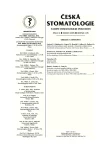-
Medical journals
- Career
On Psychotherapy of Non-collaborative Children
Authors: K. Nováková 1; P. Němečková 2; Z. Kolařík 3; S. Richterová 1
Authors‘ workplace: I. stomatologická klinika LF UP a FN, Olomouc přednostka doc. MUDr. J. Stejskalová, CSc. 1; Soukromá psychiatrická a pedopsychiatrická ambulance, Prostějov 2; Soukromá ambulance klinické psychologie a psychiatrie, Hranice 3
Published in: Česká stomatologie / Praktické zubní lékařství, ročník 105, 2005, 2, s. 46-51
Overview
In a longitudinal study the authors follow the possibilities of positively influencing the behavior in 258 non-collaborative children in a dental office. The efficiency in the scale of psychotherapeutic procedures and methods is evaluated, in cases of failure premedication is administered and if necessary the treatment is performed in general anesthesia in relation to age and intellectual level. Psychotherapy was successfully applied during the entry examination of the admitted patients in almost a half of the cohort (43.4%), one third of the cohort was treated in general anesthesia. No problem behavior was encountered in 55.5% of the whole cohort during the final treatment.
The behavior without problems was most frequent in individuals intellectually within normal range (in 81.2%), less frequently in children of special schools (32.1%), whereas in individual not attending school there was no adjustment of behavior.Key words:
non-collaborative patient – psychotherapeutic methods – behavior adjustment
Labels
Maxillofacial surgery Orthodontics Dental medicine
Article was published inCzech Dental Journal

2005 Issue 2-
All articles in this issue
- Oral Health of Haemodialysed Patients with Chronic Renal Failure
- On Psychotherapy of Non-collaborative Children
- Tooth Ankylosis
- Frequency and Severity of Facial Injuries in Cyclists A Comparative Study from the Years 1980–1982 and 2000–2002
- Treatment of a Mentally Ill Patient under the Support of Implants
- Radiation Dose of X-ray and CT Examination in Stomatology
- Therapy of Radiation Caries
- Czech Dental Journal
- Journal archive
- Current issue
- Online only
- About the journal
Most read in this issue- Tooth Ankylosis
- Radiation Dose of X-ray and CT Examination in Stomatology
- On Psychotherapy of Non-collaborative Children
- Therapy of Radiation Caries
Login#ADS_BOTTOM_SCRIPTS#Forgotten passwordEnter the email address that you registered with. We will send you instructions on how to set a new password.
- Career

